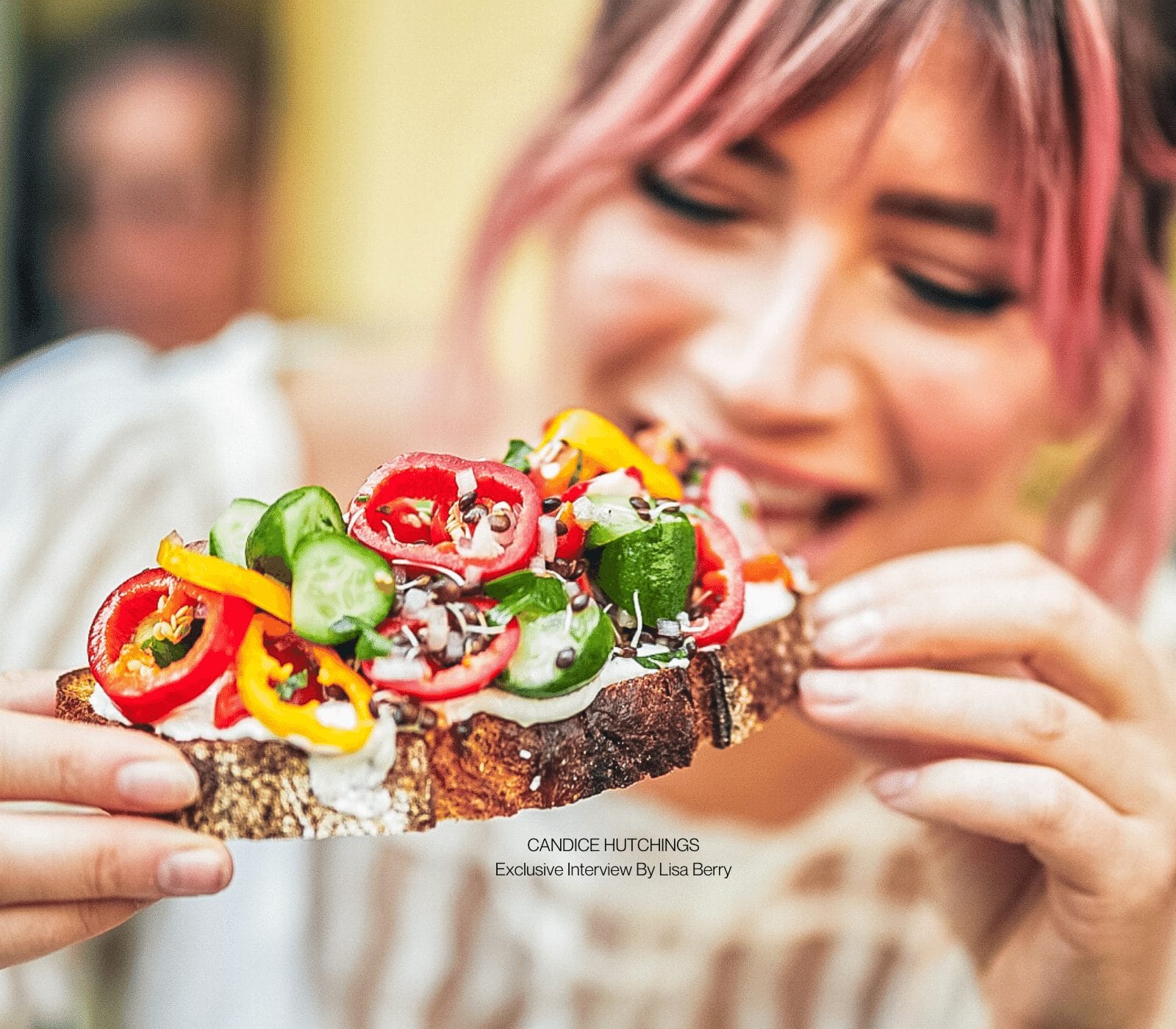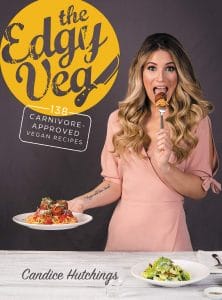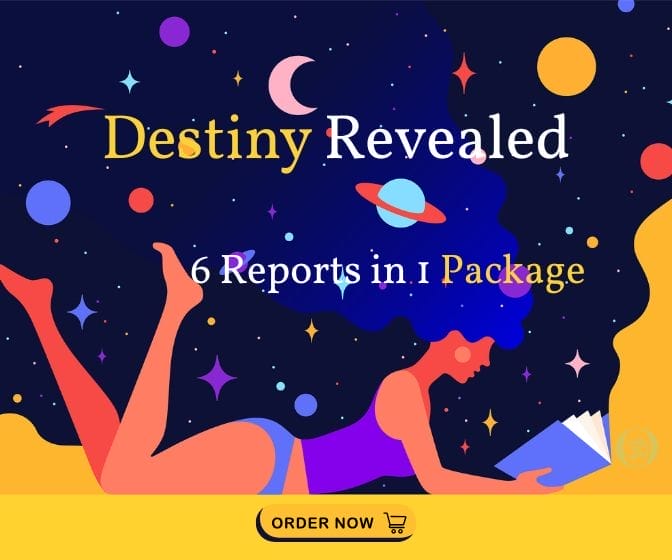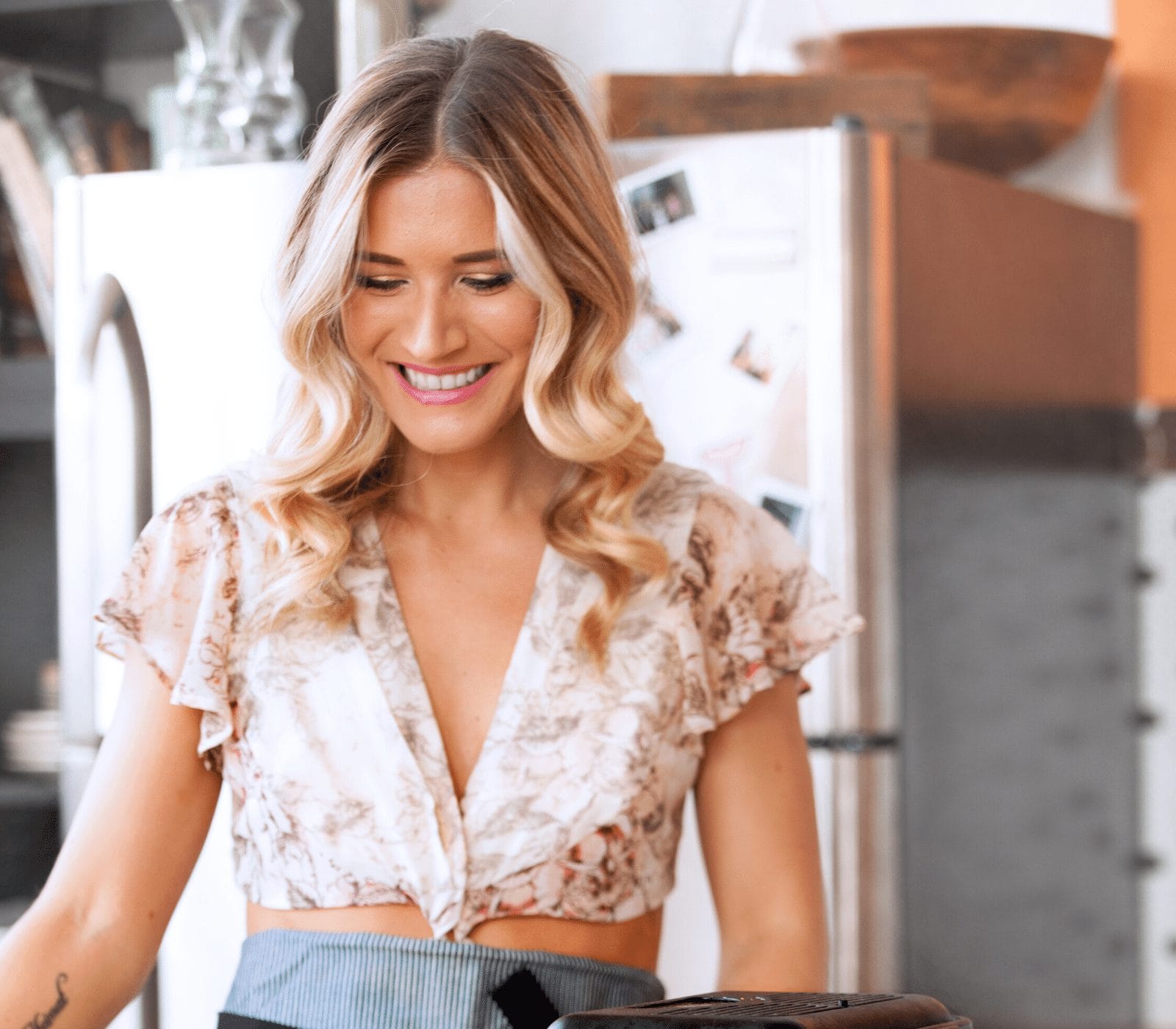Candice Hutchings: Beyond Vegan

Candice Hutchings is a Canadian YouTube personality, vegan chef, comedian, and author of the cookbook 138 Carnivore Approved Vegan Recipes. She runs a YouTube cookery-related channel The Edgy Veg which has received over 22 million views and over 250 thousand subscribers.
An Interview with Candice Hutchings – Beyond Vegan
Interview by Lisa Berry
Photographs by Amir Menahem
To listen to the full interview of Candice Hutchings by Lisa Berry on Light on Living on OMTimes Radio, click the player below.
When I think about the food, there are so many “How does food make me feel? Is it prepared, what does it taste like?” I am always excited about food, but our guest today has really offered  people a new way of eating, a new way of thinking about food, and really a lifestyle around food. Candice Hutchings, who is the face of The Edgy Veg, is on a journey to revolutionize how we think about food, eco-conscious living, and feminism. Author of the cookbook 138 Carnivore Approved Vegan Recipes, Candice delivers Vegan recipes with attitude and comedy. Edgy by nature, both her popular YouTube channel and Instagram pages have disrupted the Vegan community with her candid and humorous take on activism, not only for animals with food built differently, but also mental health, the environment, and female empowerment.
people a new way of eating, a new way of thinking about food, and really a lifestyle around food. Candice Hutchings, who is the face of The Edgy Veg, is on a journey to revolutionize how we think about food, eco-conscious living, and feminism. Author of the cookbook 138 Carnivore Approved Vegan Recipes, Candice delivers Vegan recipes with attitude and comedy. Edgy by nature, both her popular YouTube channel and Instagram pages have disrupted the Vegan community with her candid and humorous take on activism, not only for animals with food built differently, but also mental health, the environment, and female empowerment.
Lisa Berry: Candice, you pack a punch in there.
Candice Hutchings: Yes, that is quite a disparate mouthful read back to me.
Lisa Berry: My first question was going to come out and say, “Oh, yes, why are you a Chef?” but really, I want to start with this. Why have you chosen to do more with being a Chef?
CANDICE HUTCHINGS: For me, I went Vegan and needed to teach myself how to cook, I was always a foodie. So, I knew that if I was going to continue this lifestyle that I had chosen, I had to be able to eat the food that I love. For me, it is that I love animals, I genuinely believe we can eat with compassionate choices and without any cruelty to them. That is why I started with that.
LISA BERRY: So, it was a heart-based choice. Did you have any allergies or health issues that initially led you to this choice?
CANDICE HUTCHINGS: Yes, it was a little bit of both. I had a lot of issues growing up health-wise in terms of skin issues. I got a lot of my grains, and it really was a dairy intolerance. Not full-fledged, but it would definitely cause migraines, so even as a child I never really drank or ate a lot of dairy for that reason, and my Mum switched from Cow’s milk to Goat’s milk when I was younger because we were raised that you need your milk to be big and strong. So that was the main driving force from a young age. Dairy was always an issue for me.
I grew up in a predominantly more European household. My Mother’s German, so for breakfast some days it was just bread and cheese, and I love cheese. So that was difficult for me, and for some reason, we just did not make the connection when I was younger that the cheese might also be causing it as well as the milk. When I was about 19-20, I started to really take note of what was causing these ridiculous migraines that would last three days at a time, and every time I cut out animal proteins, they would disappear.
LISA BERRY: You mentioned that you were a foodie already. Tell me about that part. What draws you to food? What excites you about food?
CANDICE HUTCHINGS: I grew up in the first few years of my life in Germany. As I mentioned, my mother was German, so I have family there. They lived in a part of Germany that was very rural, so a lot of farmers, a lot of wine farmers, a lot of vegetables, that sort of thing. My Grandparents always had a farm and grew their own vegetables, and so I was raised around fresh, beautiful ingredients from a really young age. Because of the nature of Europe, I mean, we were constantly graveling. We were going to Italy for a summer vacation; there, I was exposed to a variety of different types of food from a really young age.
I just fell in love with the culture of food, the way it brings us together, the nostalgia, the memories that it gets when you share a meal. We know this, those memories are triggered a lot of the time by the smells and the taste. I was really enamored and deeply passionate about that side of food from a really young age.
LISA BERRY: I am assuming your Grandparents and people around this culture that have a relationship with food and understand when it is grown and how it is grown and what works well with others. Did you get those lessons about what was produced at what time of year because of this?
CANDICE HUTCHINGS: Absolutely. I learned not only the kind of science behind the times that things are grown but also the hard work that goes into the food. I mean, I would help my grandpa in the gardens. We would hoe up the potatoes. We would pick lettuce and bring it down to my Grandmother, and she would make a fresh salad from lettuce that I picked out of the garden. So, I was exposed to the hard work around food, which I feel we take advantage of a lot of the time. We forget how much work goes into the food that we are going into the grocery store and just picking up from a shelf or a fridge and buying. I learned those hard-knock life lessons associated with food from a super young age.
LISA BERRY: Do you think that helps, not just you, but if other people in the world did more of that, do you think that would help reduce the waste of food?
CANDICE HUTCHINGS: I think so because then you have a respect for food. Something that I was always raised with is respect for food, and nothing goes to waste. My Grandparents being of that old-world, European life that they grew up with. They lived through wars. I was taught a lot of those lessons, and they used everything. They would use the leftover berries to make juices and wines and peels they would rub with oil and make a totally different dish out of potato peels and that sort of thing. If you were taught those lessons at a really young age, or just even now go out and learn them, you definitely have a respect for food that really makes you feel guilty when you’re wasting something.
LISA BERRY: You ate meat growing up, and then the switch came based around a dairy thing and the migraines, but then you took it a step further and went Vegan, completely Vegan. Was that an easy choice for you?
CANDICE HUTCHINGS: It was an easy choice from an animal standpoint. For me, again, I grew up in the country, I grew up around farms, so I always grew up around farmed animals. Also, it is a respect thing for me. I had respected those farm animals from such a young age, and I was exposed at a really young age, which I do not think a lot of people now are. They don’t really make the connection between a living being, like a dog or a cat, it’s the same type of thing, and their food, right? So, for me, that part was easy. It was navigating my life with this new lifestyle that was difficult because I went Vegan 10 years ago. We did not have all these beautiful, delicious substitutes that we have now. It was not a topic that was really talked about a lot. If it was, there was a lot of stigma behind it: that Vegans are frail, so from that standpoint, it was challenging. I felt very isolated at the beginning. I felt left out in a lot of family situations, a lot of social situations because it just was not a thing back then.
LISA BERRY: You mentioned that Vegans are frail. How do you feel right now? Do you feel healthy and robust, and your vitality is out there?
CANDICE HUTCHINGS: Yes. I feel great. I wake up every day, and I did a workout this morning, a fasting workout, and then had this huge, giant smoothie, and I feel incredible right now. I genuinely believe that there is that body-mind connection when it comes to just eating more healthfully. Obviously, there’s a lot of Vegan junk foods out there, and you can make them at home yourself, but for the most part, if you’re eating a whole-foods, plant-based diet, you’re literally putting life into your body. So, I would say that 95% of the time, I feel great. I get sick like anybody else, but I do feel good, and that is nice.
Continue to Page 2 of the Interview with Candice Hutchings
OMTimes Magazine is one of the leading on-line content providers of positivity, wellness and personal empowerment. OMTimes Magazine - Co-Creating a More Conscious Reality






